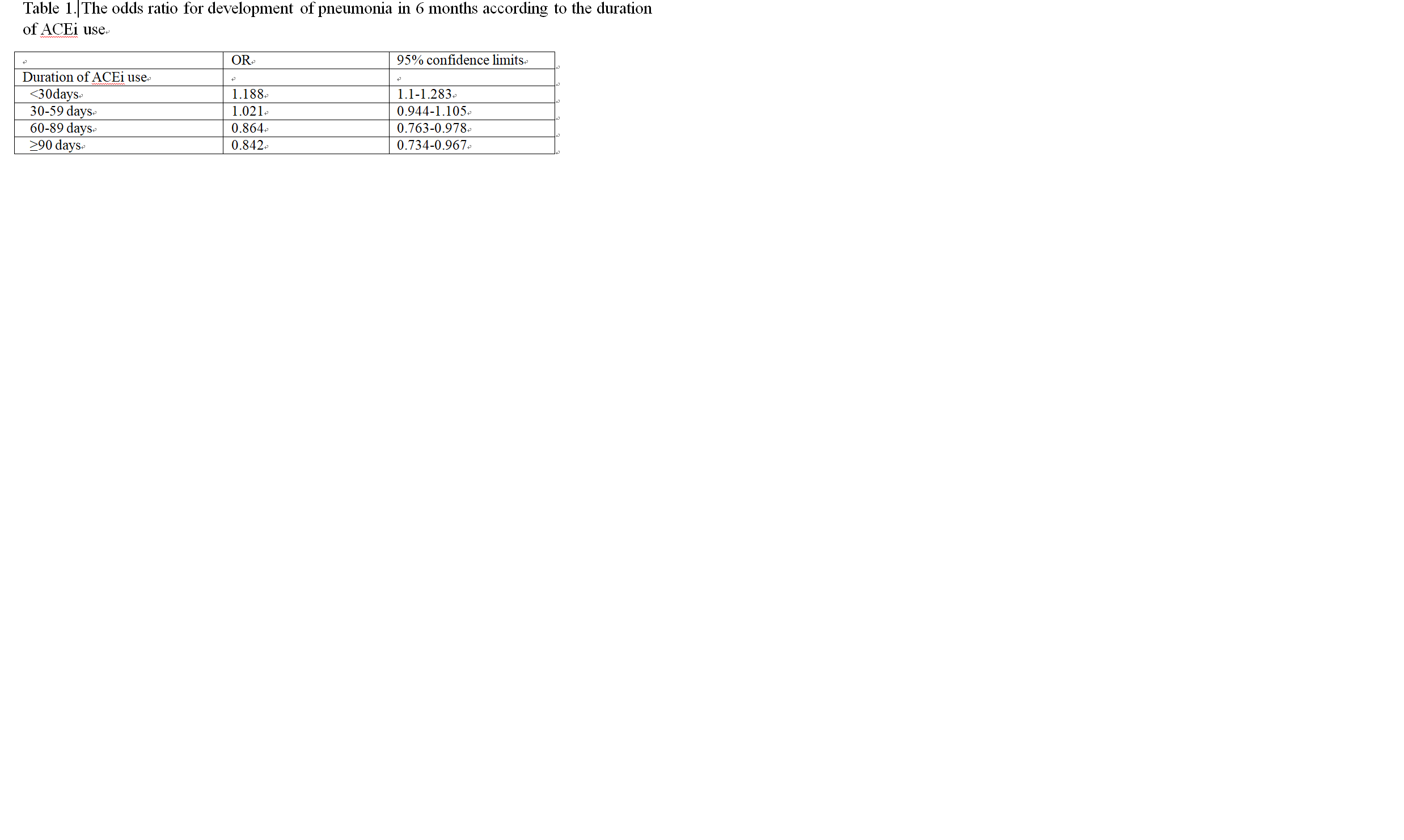Category: Parkinson's Disease: Non-Motor Symptoms
Objective: This study aimed to evaluate the effects of angiotensin-converting enzyme inhibitors (ACEi) on the prevalence of pneumonia in patients with Parkinson’s disease (PD).
Background: Cough is one of the adverse effects of ACEis. It may result from bradykinin, degraded by angiotensin-converting enzyme, which sensitize sensory nerves of the airways and may enhance the cough reflex. Previously, there have been researches that proved the preventive effect of ACEis on the pneumonia in general population and patients with stroke. Patients with PD also develop dysphagia and at high risk of aspiration pneumonia.
Method: The data was extracted from the National Health Insurance System (NHIS) database in South Korea. The study population comprised of patients with newly diagnosed PD from January 1, 2004 to December 31, 2019. The numbers of ACEi users and non-users were 18,602 and 190,411, respectively. Then, we matched the two groups using variables including sex, age, PD duration, and Charlson comorbidity index (CCI) score. We observed the prevalence of aspiration pneumonia for 90 days from ACEi prescription.
Results: Total numbers of patients and visits are 209,013 and 1,193,675, respectively. There was no significant preventive effects when ACEis were used for less than 30 days (OR 1.188, 95% CI 1.1-1.283) and 30-59 days (OR 1.021, 95% CI 0.944-1.105). However, ACEis were used for more than 60 days, it decreased the risk of aspiration pneumonia. (OR 0.864, 95% CI 0.763-0.978 for 60-89 days and OR 0.842, 95% CI 0.734-0.967 for more than 90 days)
Conclusion: Angiotensin-converting enzyme inhibitors can decrease the risk of aspiration pneumonia in patients with PD. However, its preventive effects are significant only in use.
References: 1. Coelho M, Marti MJ, Tolosa E, et al. Late-stage Parkinson’s disease: the Barcelona and Lisbon cohort. J Neurol 2010;257(9):1524-1532.
2. Won JH, Byun SJ, Oh BM, Kim HJ, Park SJ, Seo HG. Pneumonia risk and its associated factors in Parkinson’s disease: A National Database Study. J Neurol Sci 2020;415:116949.
3. Caldeira D, Alarcao J, Vaz-Carneiro A, Costa J. Risk of pneumonia associated with use of angiotensin converting enzyme inhibitors and angiotensin receptor blockers: systematic review and meta-analysis. BMJ 2012;345:e4260.
4. Fox AJ, Lalloo UG, Belvisi MG, Bernareggi M, Chung KF, Barnes PJ. Bradykinin-evoked sensitization of airway sensory nerves: a mechanism for ACE-inhibitor cough. Nat Med 1996;2(7):814-817.
5. Wang HC, Lin CC, Lau CI, Chang A, Kao CH. Angiotensin-converting enzyme inhibitors and bacterial pneumonia in patients with Parkinson disease. Mov Disord 2015;30(4):593-596.
To cite this abstract in AMA style:
A. Kim, JY. Joon Yeon. Angiotensin-converting enzyme inhibitors prevent pneumonia in patients with Parkinson’s disease [abstract]. Mov Disord. 2023; 38 (suppl 1). https://www.mdsabstracts.org/abstract/angiotensin-converting-enzyme-inhibitors-prevent-pneumonia-in-patients-with-parkinsons-disease/. Accessed May 10, 2025.« Back to 2023 International Congress
MDS Abstracts - https://www.mdsabstracts.org/abstract/angiotensin-converting-enzyme-inhibitors-prevent-pneumonia-in-patients-with-parkinsons-disease/

